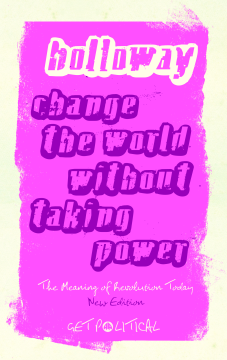
Additional Information
Book Details
Abstract
The wave of political demonstrations since the Battle of Seattle in 2001 have crystallised a new trend in left-wing politics. Modern protest movements are grounding their actions in both Marxism and Anarchism, fighting for radical social change in terms that have nothing to do with the taking of state power. This is in clear opposition to the traditional Marxist theory of revolution, which centres on the overthrow of government. In this book, John Holloway asks how we can reformulate our understanding of revolution as the struggle against power, not for power.
After a century of failed attempts by revolutionary and reformist movements to bring about radical social change, the concept of revolution itself is in crisis. John Holloway opens up the theoretical debate, reposing some of the basic concepts of Marxism in a critical development of the subversive Marxist tradition represented by Adorno, Bloch and Lukacs, amongst others, and grounded in a rethinking of Marx's concept of 'fetishisation' - how doing is transformed into being.
'Stands alongside Hardt and Negri's Empire as one of the two key texts of contemporary autonomist Marxism'
Alex Callinicos, Capital & Class
'This is a refreshing, thought provoking book ... A must read for every student and practitioner of political science'
USI Journal
'Holloway's thesis is indeed important and worthy of notice'
Richard J. F. Day. TOPIA, Canadian Journal of Cultural Studies
Table of Contents
| Section Title | Page | Action | Price |
|---|---|---|---|
| Cover | Cover | ||
| Contents | v | ||
| Acknowledgements | vi | ||
| Preface to the First Edition | viii | ||
| Preface to the New Edition | ix | ||
| 1. The Scream | 1 | ||
| 2. Beyond the State? | 11 | ||
| 3. Beyond Power? | 19 | ||
| 4. Fetishism: The Tragic Dilemma | 43 | ||
| 5. Fetishism and Fetishisation | 78 | ||
| 6. Anti-Fetishism and Criticism | 106 | ||
| 7. The Tradition of Scientific Marxism | 118 | ||
| 8. The Critical-Revolutionary Subject | 140 | ||
| 9. The Material Reality of Anti-Power | 155 | ||
| 10. The Material Reality of Anti-Power and the Crisis of Capital | 176 | ||
| 11. Revolution | 204 | ||
| Epilogue: Moving Against-and-Beyond Reflections on a Discussion | 216 | ||
| Notes | 246 | ||
| Bibliography | 265 | ||
| Name Index | 274 | ||
| Subject Index | 276 |
